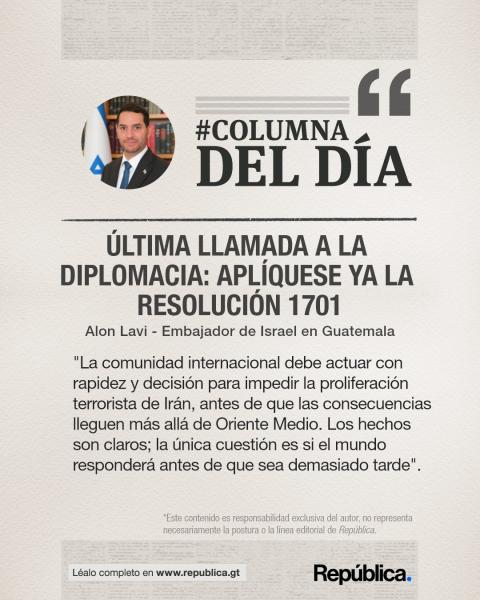OPINION COLUMN by the Ambassador of Israel to Guatemala Alon Lavi

Last call for diplomacy: implement Resolution 1701 now!
Hezbollah's relentless offensive is driven by Iran, the world's largest state sponsor of terrorism. Iran's fingerprints are not only on Hezbollah, but also on Hamas, the Houthis and a network of Shiite militias across the Middle East, especially in Syria and Iraq.
Israel is once again under attack. The Hezbollah terrorist organization intensified its aggression against Israel on September 21, launching a series of attacks targeting civilian population centers inside Israel, devastating everything in its path. In recent days, Hezbollah has greatly expanded the range of its rocket attacks, adding half a million more Israelis to those already at risk from previous attacks.
The current conflict initiated by Hezbollah began unprovoked by Israel on Oct. 8, with frequent attacks launched from southern Lebanon, a territory from which Israel withdrew completely in 2000. Last Sunday's attack follows more than 11 months of rocket fire, which has claimed the lives of dozens of Israelis, including 12 innocent children killed during a soccer match. These attacks have turned Israel's northern border regions into a death zone, displacing some 70,000 Israelis from their homes and creating a humanitarian and security crisis that cannot be ignored.
On September 20, the IDF attacked senior Hezbollah commanders, who were holding a high-level meeting, planning a large-scale terrorist attack on Israeli communities, which would mirror the horrific massacre of October 7. Israel acted to prevent this attack and protect its citizens from an imminent threat.
In the face of the Hezbollah attack, Israel is doing what any sovereign nation would do: defend the security of all its citizens, Jews and Arabs alike. Every state has a duty to protect its people from attacks originating from enemies beyond its borders. Israel is fulfilling this obligation under international law and will continue to do whatever is necessary to ensure that its citizens can return safely to their homes.
The international community is increasingly aware of Hezbollah's destabilizing role in the region. Labeled a terrorist organization by numerous countries, including the United States, Arab League member states, Germany, Australia and the United Kingdom. Hezbollah actively participated in the massacres committed by the Syrian regime and is a focal factor in the chaos in the region. To effectively restore stability in the Middle East, it is crucial that the world community unite to officially recognize Hezbollah as a terrorist organization.
It doesn't end there. Hezbollah's relentless offensive is fueled by Iran, the world's largest state sponsor of terrorism. Iran's fingerprints are not only on Hezbollah, but also on Hamas, the Houthis and a network of Shiite militias throughout the Middle East, especially in Syria and Iraq. Iran's proxies are actively working to spread violence and chaos. The Iranian regime has long sought to destabilize the region, imposing its radical ideology through violence to reshape the Middle East.
However, Iran's ambitions go far beyond that. Its influence extends to Europe, Africa and the Americas. It threatens global security, including by supplying drones and missiles to attack Ukraine, as it supports efforts that undermine peace and stability around the world.
“The international community must act swiftly and decisively to prevent Iran's terrorist proliferation before the consequences reach beyond the Middle East. The facts are clear; the only question is whether the world will respond before it is too late.”
If the world wants to end the violence and restore stability, it will act decisively. First, the international community must increase sanctions against Iran, targeting the Ayatollahs' regime's financial, military and terrorist networks.
In particular, the world must officially designate Iran's Revolutionary Guard Corps as a terrorist organization. The IRGC is the nerve center of Iran's global terrorist operations. By sanctioning and isolating this entity, the international community can cripple its ability to fund and direct groups like Hezbollah. Without this crucial step, Iran will continue to evade accountability, allowing it to pursue its destabilizing goals unchecked.
The international community must act swiftly and decisively to prevent Iran's terrorist proliferation before the consequences reach beyond the Middle East. The facts are clear; the only question is whether the world will respond before it is too late.
In addition, the UN Security Council must finally implement Resolution 1701, which mandates the withdrawal of Hezbollah forces in Lebanon north of the Litani River. This resolution was passed to end Hezbollah's dominance in southern Lebanon and prevent its attacks against Israel, but Hezbollah continues to operate freely in that area, with the full support of Iran.
Hezbollah's domination of Lebanon, its occupation of southern Lebanon, its reign of terror against Israeli civilians and Iran's unrelenting support for this terrorist organization and its malevolent activities must be confronted. Israel is at the forefront of this battle, defending not only its citizens, but also the security and values of the free world.
The threat posed by Iran and Hezbollah is undeniable. The time to act is now. Those who are truly committed to peace and stability in the region must push for the immediate implementation of Security Council Resolution 1701. It is the only way to stop an all-out war.
